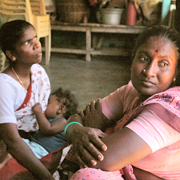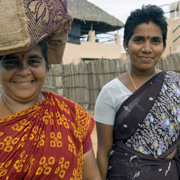Women's lives in India
Mr. Sudesh Malla is Project Coordinator of the SOS mother strengthening programmes in the north Indian state of Jammu and Kashmir. Terrorism and militancy have traumatised the entire region. Many women have lost their husbands, have no means to feed or educate their children and have nobody to turn to. SOS Children’s Villages is supporting these women in the education of their children, while at the same time training and counselling them on how to lead an independent life.
What is the general situation in Jammu?
Jammu & Kashmir comprises of three regions: Jammu, Kashmir and Ladakh. The Jammu region consists of hilly areas of Doda, Badherwah, Kishtwar, Banihal & Udhampur. The ratio of women:men is 933:1000 (2001 census). The overall literacy rate is 65.38%. Among women, the literacy rate is 54.16% (2001 census).
Terrorism and militancy continue to traumatised the entire region, were many people - especially children and young adults - have become victims of the atrocities which begun in 1989. Many people from the hilly areas of Doda, Badherwah, Kishtwar and the valley of Kashmir have migrated to towns and cities, leaving many women alone and with little support for their families.

How do cultural traditions influence social development?
Outside the city of Jammu, women are not encouraged to work, as people of the hilly areas feel insecure about sending their women outside to work.. The women mainly look after their family as housewives. The literacy rate in hilly areas is alarmingly low. Ch in Doda and Udhampur districts have to walk more than ten kilometres to reach school. They mostly go to government-run schools.
The menace of militancy has affected the society. Since 1989, deaths are a regular daily occurence. The sole bread earners for the family have become the victims of militancy. The educational institutions have also suffered and have become dysfunctional. Mass migrations of families from Doda and Udhampur districts to nearby towns are common, as people search for work and look after the safety of their children. There have even been mass migration from the Kashmir Valley to different parts of Jammu.
These families have settled in temporary sheds, which in turn have become huge camps. The
condition of the people in these camps is deplorable. The transition from the open spaces of the villages to the dense clusters on the outskirts of the towns and cities has created stress on the population in general, and on women in particular. There have been instances of selective abortions, sexual harassment and domestic violence against women. Hygiene in the camps is insufficient. A study conducted by the Medical Council of India found a number of gynaecological disorders among women, such as early puberty and early menopause.
How does SOS Children’s Villages help?
SOS Children’s Villages of India is helping mothers with their children’s education through family strengthening programmes. In 1995, SOS Children’s Village Jammu opened eight multi-purpose activity centres and provided training to women in tailoring, handicrafts, typing and shorthand, which enabled them to earn a living.
We opened two centres in Udhampur (70 km from Jammu), which train women in cutting and tailoring and typing and shorthand. Similar centres opened in Nagrota (about 12 km from Jammu) supporting a number of remote villages in Muthi and Mishriwala. These centres offered courses in cutting, tailoring, embroidery and typing and shorthand. Trainees were made instructors to train even more women. An average of 90 women receive training each year. For the last eleven years, these multi-purpose activity centres have produced more than 1000 trained women who are earning their livelihood and carrying on their lives with dignity. These centres operate for four-to-five hours per day so that mothers can look after their families.

Who benefits from these programme?
Widowed and divorced women benefit under this programme. In instances where the family lives below the poverty line, the main objective of the programme is to help these women with their children’s education.
What are the most important things women have to learn to lead a successful life in the present society?
Women have to become confident and independent to face the challenges in life. At times they may be less educated but the hidden talent in them can create wonders. Better education will always be a source of strength for them. She must always realize her own potential. She should have an inner feeling of equal status in the family as well as the society.
What possible impact does the programme and its various activities have on the lives of the children?
SOS Children's Villages has become a trusted place for these families. Children and mothers express their difficulties to the SOS co-workers, who provide them with a platform to utilise their hidden talents. The focus is on training women in cutting, tailoring and embroidery at the multi-purpose activity centres. Mothers work from their residences and earn their livelihoods in a comfortable setting. The children receive and education and mothers spend their money on school fees, books and stationery. The absence of the male figure from the family is no longer a handicap. The interaction between SOS Children's Villages and these families increases every day. The periodic medical checkups of these families has gone a long way in preventing common diseases among these women and children.